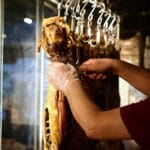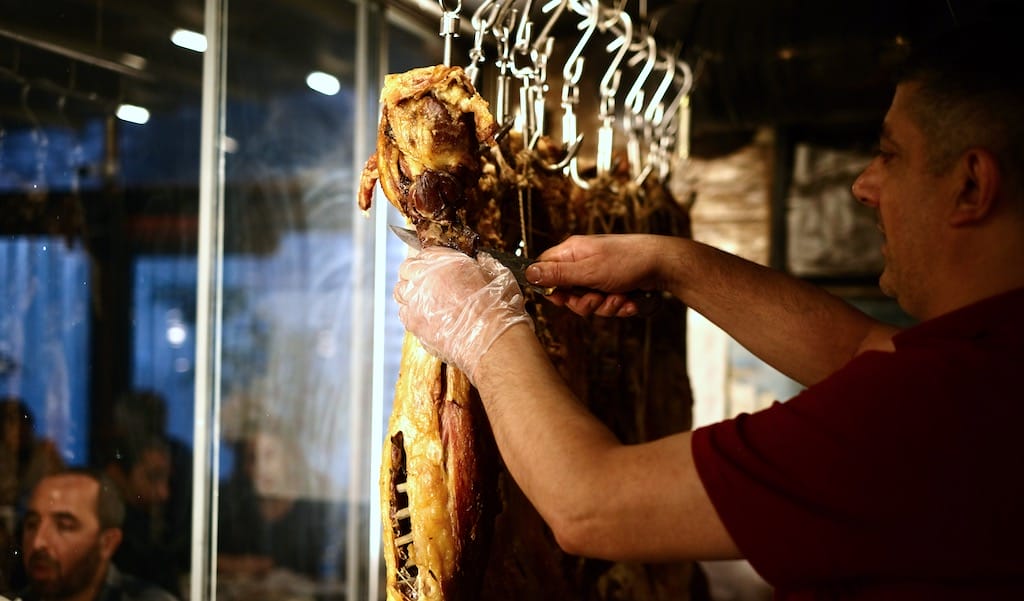Up above Freedom Square where the Sololaki and Mtatsminda neighborhoods blend together, there is a 100-year-old building with an apartment five steps below the sidewalk. It’s a warm, intimate space, part living room, part museum. A massive collection of wine glasses hang from the ceiling, 19th-century framed portraits of Georgians decorate one wall above a piano, while opposite are glass cases displaying antique ceramic pitchers and elegant, polished drinking horns called kantsi.
There are also two vintage silver vessels – exquisite ashtray-sized pans with long stylized handles used in days of old for drinking wine to special toasts. This cup is called an azarphesha, and this entire collection (and the walls containing it) belong to Luarsab Togonidze, a folklorist, author, entrepreneur and co-owner of this welcoming restaurant, also called Azarphesha.
“I’ve always been familiar with the restaurant business. My father established Salobie, the famous restaurant near Mtskheta,” Luarsab explains. “During Communist times you couldn’t own a restaurant, but basically it was his and remains in the family today.”

We are nibbling on a simple loose-leaf salad with slices of quince and chunks of smoked sulguni doused in balsamic vinegar, a refreshing, invigorating song of flavors and textures. The restaurant won’t serve the classic Georgian tomato and cucumber salad until those ingredients are in season.
“My dad didn’t want me to follow in his footsteps. He wanted me to be a scientist, a historian,” Luarsab reveals after a subtle pull on his glass of rkatsiteli, one of many delicious natural wines on the menu.
He inherited the Igorovka Street space and thought about turning it into a bookbinding workshop or a photo studio before realizing he could combine his love for Georgian folklore with his other passions: natural wine, food, and music, which he calls “living art.” In 2013, he opened Azarphesha with an American named John Wurdeman, who shared the same devotion to Georgia’s living arts.
John is a painter who wandered into Georgia in 1995 and soon went native in Signaghi, a Kakhetian town then suffering from a lack of water and, like the rest of the country, chronic electricity cuts. He soon learned the impossible language, married a beautiful Georgian folk singer and started a family. A chance encounter while painting a vineyard against the backdrop of the Caucasus range turned him into a winemaker and begat Pheasant’s Tears Winery. Since then, John, who Luarasab has known for some 20 years, has become the leading emissary for Georgia’s natural wine movement, helping the world learn about the singularity of this country’s wine and helping journalists and writers hook up with the right food and wine people across the regions. He is also co-owner of the Tbilisi natural wine bar Vino Underground.
“We were one of the first places in Georgia to offer natural wine and organic food together. John is behind the menu, my wife Nino [Mamulashvili] manages the restaurant, and I’m in charge of hospitality,” Luarsab says with a boyish grin under a well-trimmed beard (although he has dug up old recipes from archives at the library).

Azarphesha sources seasonal organic produce from known growers. John is a vegetarian so there is a meat-free slant, although the roasted chicken tabaka is no-frills magic with the crispiest skin in town. The food here is both traditional and original. Pickled peppers, for example, are always served straight out of the brine, but Azarphesha heats them up and drizzles raw sunflower oil on them with chopped parsley. This mellows the sourness and adds a layer of earthiness and sophistication to a peasant side dish.
In 2016, John and Luarsab opened a sister restaurant, Poliphonia, in the old Shavi Lomi location. The idea here is to let young chefs spread their wings with local innovations like baked fermented pumpkin with figs, sunflower seeds and pine nuts, and chicken in a buckthorn and rose hip sauce. Some people might balk at such non-conformity to traditional cuisine, but Luarsab has a more studied take on Georgian heritage. In 2010, he opened Samoseli Pirveli, Tbilisi’s first chokha atelier in 2010 where they have recreated the national costume down to the material and stitch, yet also design more contemporary takes on the long-established style.
“Our (Georgian) tradition is to be creative,” Luarsab maintains. “The Communists corrupted Georgian tradition and people’s understanding of it. Experimentation was forbidden in Soviet restaurants. We like to experiment. Sometimes things work, sometimes they don’t.”
“People need a setting like this, a sanctuary with food, music and wine. It’s what we believe.”
Azarphesha seats around 28 people in the main room. Luarsab says they have been offered a bigger space but they believe an intimate setting provides for a more rewarding dining experience, which in Azarphesha’s case often means hearing polyphonic singing break out at a table and feeling as if you are at a bonafide supra, or Georgian feast. Luarsab embraces the opportunities to be tamada, the toastmaster, with pride and raises what is often a repetitive proletarian drinking ritual to an art form.
“We have a saying, ‘If you’re not sincere, you shouldn’t say anything.’ A tamada doesn’t just make toasts, but pays attention to the guests and balances the dynamics at the table. He introduces new topics and ideas that involve everyone,” Luarsab explains.
“It is really incredible, to see tears of joy and experience this brief moment at the table where you feel life is so worth it. A good tamada can transform a simple dinner into a revelation.” He sweeps his long arm toward his cherished collection of photographs and adds, “People need a setting like this, a sanctuary with food, music and wine. It’s what we believe.”
Published on February 14, 2020
Related stories
May 3, 2023
LisbonSenhor António, the keeper of one of the oldest grocery shops in Lisbon, Mercearia Celta, died two weeks ago. With his passing, Culinary Backstreets Lisbon lost a dear friend and the city lost a living link to what is an increasingly disappearing past. “That’s life.” This phrase would end most of our conversations and visits…
February 2, 2022
Istanbul | By Erin O’Brien
IstanbulAsk anyone from the Eastern Turkish city of Bitlis where büryan kebabı comes from, and they’ll proudly tell you that the slow-cooked meat dish hails from none other than their hometown, near Lake Van. Pose the same question to folks from Siirt, just 100 km south, and they’ll insist anyone making it from a city…
November 4, 2013
IstanbulUpdate: Furreyya and Mohti Laz Meyhane are sadly no longer open. As a chill sets in and heavy clouds roll over Istanbul, turning the Bosphorus battleship gray, we say goodbye to the luscious strawberries and blood-red tomatoes in the market. Fall marks the start of hamsi season, a time when small anchovies fill the nets…



















































































